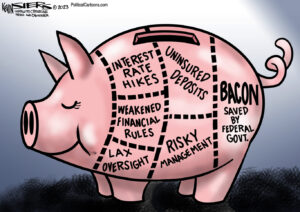A ‘TARP’ to Cover Detroit
The White House has shifted from its original position to state that it now is willing to consider using bailout funds from the $700-billion Troubled Asset Relief Program, or TARP, to keep the country's top three automakers afloat. The announcement comes after negotiations in Congress to provide a $14-billion bailout to Detroit broke down.
The White House has shifted from its original position to state that it now is willing to consider using bailout funds from the $700-billion Troubled Asset Relief Program, or TARP, to keep the country’s top three automakers afloat. The announcement comes after negotiations in Congress to provide a $14-billion bailout to Detroit broke down.
Your support matters…The Washington Post:
The Bush administration said today it is willing to consider using funds from other sources to provide emergency aid to the nation’s Big Three car companies following the Senate’s rejection Thursday night of a congressional bailout plan.
The statement from White House spokeswoman Dana Perino marks a shift in tone for the administration, which has so far rejected the idea of using money from the $700 billion Troubled Asset Relief Program or other sources under its control to help the auto industry survive. After the collapse of negotiations in Congress, however, the White House said all options are on the table to help keep the automakers in business. GM and Chrysler have said they are in critical need of help, while Ford’s position is less dire.
“Under normal economic conditions we would prefer that markets determine the ultimate fate of private firms,” the White House statement said. “However, given the current weakened state of the U.S. economy, we will consider other options if necessary — including use of the TARP program — to prevent a collapse of troubled automakers.”
Independent journalism is under threat and overshadowed by heavily funded mainstream media.
You can help level the playing field. Become a member.
Your tax-deductible contribution keeps us digging beneath the headlines to give you thought-provoking, investigative reporting and analysis that unearths what's really happening- without compromise.
Give today to support our courageous, independent journalists.




You need to be a supporter to comment.
There are currently no responses to this article.
Be the first to respond.